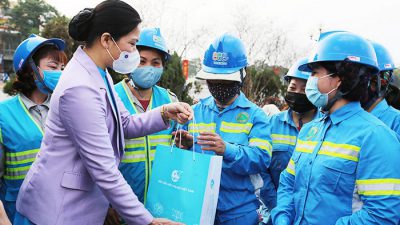
|
In recent years, Vietnam’s innovative start-up ecosystem has gradually been formed and developed, with the active participation of the actors in the ecosystem. The legal system has contributed to promoting innovative start-ups, thus supporting the operation of enterprises in this field. In the next period, the innovation start-up ecosystem needs to create breakthroughs and develop more strongly in order to mobilise resources from the public and private sectors, domestic and foreign, and strengthen linkages and effective coordination between entities in the ecosystem. |
|
According to experts, the innovation start-up ecosystem in Vietnam is thriving thanks to the expanding scale of the national economy. In 2020, the Vietnamese market has been assessed as a safe destination and selected by investors and investment funds. According to Hoang Thi Kim Dung, Head of Japan-based Genesia Ventures Representative Office in Vietnam, investors have high hopes for the potential of the Vietnam’s innovation start-up ecosystem, expecting Vietnam to be a potential market in Asia, after Indonesia. Vietnam has a young population with a passion for starting businesses; with a large number of start-ups, the good quality of human resources training and the great deal of companionship from the Government. In recent years, the Ministry of Science and Technology has implemented many programmes and projects that are the foundation to build the national innovation system, such as: The Vietnam – Finland Innovation Partnership Programme (IPP); and the Project of Technology Commercialisation following the Silicon Valley model in Vietnam. In particular, the “Supporting National Innovative Start-up Ecosystem to 2025” project, also known as Project 844, has focused on capacity building, organising training and training for entities in the ecosystem, as well as developing cooperation, association and communication. The results have contributed to building a new generation of innovation start-up enterprises with the development of new models and solutions applying 4.0 technology in many fields, such as: Abivin (Supply Chain Optimisation solution); Nami (rental housing management software); Ekid (smart toys and teaching aids); and Medlink (a platform connecting pharmaceutical firms with pharmacies). Notably, there are two start-ups valued at more than US$ 1 billion, including VNG Joint Stock Company (Vinagame) and VNP; meanwhile, there are about ten start-ups valued at more than US$ 100 million. In addition, there are 61 investment funds operating in Vietnam, an increase of 50% compared to in 2018; 57 incubators and 25 organisations implementing business promotion programmes, three to four times higher than in 2016; and 170 facilities to support start-ups. Many experts believe that, in the next period, the innovation start-up ecosystem needs to be further developed to truly become a favourable environment for creating the innovation start-up ideas and enterprises. Currently, the ecosystem features strong participation from the private sector, especially experts, investors, successful overseas Vietnamese, so it is necessary to have a unified management focal point, which plays the role of coordinating resources, such as technology, people, and investment capital. The events related to start-up innovation should be directed at serving a variety of goals and purposes, to avoid duplication and spread. The roles of the State, the Government and a decisive joint coordination focal point in the formation and nurturing of healthy development of the innovation start-up ecosystem. The State should to comprehensive impacts on the entities in the ecosystem, promote the linkages, thereby helping to form a strong business force, leveraging rapid, high-quality and sustainable economic growth. The policy system for the innovation start-up should also continue to amend, supplement and remove barriers, and at the same time, develop incentives to encourage investment in start-up innovation. Currently, investment funds are often located in foreign countries; and start-ups tend to operate in Vietnam but be established in Singapore to receive investment capital. A representative of Medlink Investment Joint Stock Company said that the general need of start-ups is to receive investment for the “pre-seed” and “seed” stages. At these stages, start-ups receive primarily investment from angel investors, not funds, but the regulation requires angel investors to have a representative and open an account in Vietnam. Due to complicated and time-consuming procedures, many start-ups have registered in Singapore to receive favourable investment capital. most of the foreign registered start-ups operating in foreign countries are of good quality, and if the policy does not improve, it will lead to a “bleeding” of start-ups. In fact, the need for capacity building of start-ups, and expert advice and support for start-up innovation to meet the demands of investors, investment funds and creating internal resources for the ecosystem is huge. According to Dr Pham Hong Quat, Director of Department of Enterprise and Market Development – Ministry of Science and Technology, it is necessary to promote efficiency and avoid wastefulness and overlap of available resources such as: Research results system, patent information, intellectual property representative organisations, researchers, experts, and science and technology organisations; network of science and technology representatives in foreign countries; and socialisation of resources from private sector, large enterprises, corporations, incubators, business promotion, resources from socio-political-professional organisations. In order to mobilise the above-mentioned resources and create a breakthrough in supporting and building the innovation start-up ecosystem, it is necessary to form new models. For example, the innovative start-up support centre model provides specific public services to start-ups, private innovative start-up support centres, nurseries and universities. Combination model between universities, research institutes with the state sector and enterprises to mobilise and effectively exploit the power of human resources, knowledge, scientific research and technology development results in vocational training and education institutions. Models on building an innovative start-up ecosystem at corporations to effectively exploit the resources of experts, supply chains, and partners of corporations on supporting start-ups are, at the same time, a way to improve the competitiveness of group in new context. Public nursery is necessary for the field of security, defence or technology affecting public health (vaccines, drugs for prevention and control of diseases), technology for environmental protection (natural disasters, earthquake, tsunami). The above synchronous solutions will surely create a strong change for innovation in the national start-up ecosystem. Source: Nhan Dan Online |

